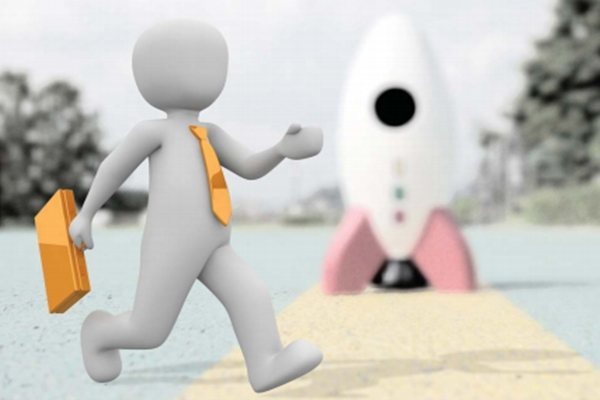If lessons from past pandemics hold, we can expect incremental changes at work to be permanent. Major changes are likely to be short lived!
There is no getting away from the new coronavirus viz. COVID-19. News media and the business press are obsessed with the infection spread, mortality, economic impact, vaccine development, human distress, and the choice of testing and treatment. A parallel industry has come into being offering products, services, and advice for reopening offices, commercial establishments and factories. Another niche area that is booming is the one relating to forecasting the future of work after the virus has done its damage.
For a pandemic that is barely three months old, the consolidation of opinion around its impact in the coming years is indeed impressive. A lot of commentators have come to a general agreement on how the virus will change the world of work. Here is a rough summary.
◆ People will work from home in larger numbers. This will ease pressure on mass transport and the road infrastructure.
◆ IT security solutions will evolve to support remote work while protecting organisational IP. Office space requirements will come down and this will impact the realty sector.
◆ Telemedicine and online education will boom and electronic payments will finally displace cash. E-commerce will grow by leaps and bounds along with the logistics industry involved in order fulfilment.
◆ The Entertainment and sports sectors will be transformed as people switch to participating from home.
◆ Manufacturing will see a surge in automation as companies reduce headcount to meet social distancing requirements.
◆ Contact tracing apps installed to manage the pandemic will stay on and privacy will get redefined for everyone.
All this is fascinating, but is probably not the way the future will pan out. To be sure, work from home will be more acceptable than before, but that’s about it. No less a person than Satya Nadella, who heads Microsoft, visualises an early return to normal work in offices, which meets the human need of eye-to-eye contact and unplanned agenda-less interaction, which builds mutual trust and enables rich insights into each other’s work.
The current work from home experience appears satisfying to many because it builds on high-trust relationships forged over years in the normal work environment with facetoface interaction.
If this prolongs, people will gradually be interacting with new hires and others whom they have never met at all. That may not be such a productive interaction. Also, the office provides a uniform environment which is a great equaliser. Not everybody is comfortable showing off their living quarters. Many do not even have a private ‘office’ corner with anything like appropriate elbow room, ergonomic seating, and reasonable quiet.
Some people have been praising the opportunities that work from home will provide women who have to drop out of work to shoulder domestic responsibilities. This has a germ of truth, but it is also true that working women look forward to going to office because that is when they are not on call for domestic chores, and can focus on work and interaction with peers. Indeed,
The continuous blend of office and home chores can become oppressive for both men and women employees. Anecdotal evidence suggests that people working from home are always on call and are putting in longer hours at work than before.
The rosy predictions of the rise of telemedicine and online education are again somewhat excessive. Schools that cater to the poorer sections of society are struggling to provide education to kids at home. Most children do not have a smartphone or an equivalent device. Even if someone in the family has such a device, it cannot be spared exclusively for the child. And in any case, the data plan being used is unlikely to support the bandwidth required for a Zoom-call. The digital divide is extensive, and if schools remain shut for long, it will translate into an educational divide, thereby deepening social inequality. No society wants that. One can therefore visualise an early opening of physical schools worldwide. This is a good thing because schools also provide an indirect preparation for getting along with people and for unstructured play, which is so essential for the development of young minds.
It is a given fact that social distancing is harder to enforce in the manufacturing sector, and work from home is virtually not possible except for a few functions in a factory. So, evaluation of automation in large concerns is a real possibility. However, the majority of employment in India comes from micro and small enterprises who neither have the cash for any serious upgrade of plant and machinery nor the headroom in workforce strength to enforce roster-based partial attendance. They are likely to take reasonable precautions for hygiene, PPE and health checks and continue doing work as before.
When the Spanish Flu hit the world in 1918-19 and killed around 5 crore people in eighteen months, there was a lot of talk about how it will change the world forever. Nothing that drastic happened and before long people were thronging theatres and trains and doing whatever they were doing earlier. Flu still kills tens of thousands of people every year, but it is hardly a topic for much discussion. Those who can get themselves vaccinated, do so and continue their normal work life. Others practice essential hygiene and isolate themselves when ill. The virus mutates over time and the vaccine is tweaked to cater to that. Much the same is expected to happen with COVID19. And talks of its long-term impact on even discretionary activities like cinemagoing and tourism are probably exaggerated too. Augustend booking for cruise ships are looking healthy, and in South Korea, there are reports of people driving two hours to see a movie in a drive-in theatre when they can just as easily stream it at home. We are social creatures and value experiences that we undergo in groups. Any restrictions on that are likely to be short-lived.
This is not to say that nothing will change. Personal protection gear like masks, and hygiene practices like increased distancing in public places, and frequent hand cleaning, will continue. And managements will be more open to people being allowed or even encouraged to work from home. Since e-learning has become more acceptable, it will extend to areas currently untouched. A new set of related skills will become valued. Anything more than that looks unlikely. Of course, all this could change with the next breakthrough discovery about the virus. One month ago, it was estimated that 7000 research articles had been published on the virus, and that the number was doubling every two weeks. With so much human brainpower unleashed on this virus, it is anybody’s guess what is likely to be discovered. However, if lessons from past pandemics hold, we can expect incremental changes at work to be permanent. Major changes are likely to be short lived!

Do you look forward to permanently working from home after the pandemic subsides?
Trending
-
SBI General Insurance Launches Digital Health Campaign
-
CredR Rolls Out 'Life Happens' Leave For Its Employees
-
Meesho Announces 30-Week Gender-Neutral Parental Leave Policy
-
Microsoft Unveils Tech Resilience Curriculum To Foster An Inclusive Future
-
60% Indian Professionals Looking For Job Change Due To COVID: Survey
-
SpringPeople And Siemens Collaborate For Digital Transformation Push
-
86% Professionals Believe Hybrid Work Is Essential For Work Life Balance: Report
-
Almost 1 In Every 3 People's Personal Life Affected Due To Work Stress
-
Meesho Rolls Out Reset And Recharge Policy For Employees
-
80% Of Talent Leaders & Academics Say Pandemic Changed Skill Needs For Youth: Report
-
Hero Electric Rolls Out 'Hero Care' Program For Employees
-
Human Capital In Collaboration With ASSOCHAM Hosts Virtual Conference
-
IKEA India, Tata STRIVE Collaborate To Create Employability And Entrepreneurship Opportunities
-
SAP India, Microsoft Launch Tech Skilling Program for Young Women
-
DXC Technology, NASSCOM Collaborate For Employability Skills Program
-
Lenskart To Hire Over 2000 Employees Across India By 2022
-
Mindtree Launches Learn-and-Earn Program
-
Tata AIA Extends 'Raksha Ka Teeka' To Its Employees
-
Swadesh Behera Is The New CPO Of Titan
-
NetConnect Global Plans To Recruit 5000 Tech Professionals In India
-
Hubhopper Plans To Hire 60% Of Indian Podcasters By 2022
-
Corporate India Needs More Women In Leadership Roles: Report
-
Aon to Invest $30 Million and Create 10,000 Apprenticeships by 2030
-
Tech Mahindra Launches ‘Gift a Career’ Initiative for Upskilling of Youth
-
40% Women Prefer Flexible Working Options in Post-COVID World: Survey
-
3 out of 4 companies believe they can effectively hire employees virtually: Report
-
Vodafone , CGI and NASSCOM Foundation launch digital skills platform
-
Odisha: Bank, postal employees to deliver cash for elderly, differently-abled persons
-
Skill India launches AI-based digital platform for "Skilled Workforce"
-
Hiring activity declines 6.73% in first quarter: Survey
-
70% startups impacted by COVID-19 pandemic
-
Bajaj Allianz Life ropes in Santanu Banerjee as CHRO
-
Over 70 Percent MSMEs look at cutting jobs to sustain businesses
-
93 Per Cent employees stressed about returning to office post-lockdown
-
Johnson & Johnson India announces family benefits for same gender partners
-
Indian firms turning friendly towards working mothers
-
Welspun India names Rajendra Mehta as new CHRO
-
Wipro partners with NASSCOM to launch Future Skills platform



Human Capital is niche media organisation for HR and Corporate. Our aim is to create an outstanding user experience for all our clients, readers, employers and employees through inspiring, industry-leading content pieces in the form of case studies, analysis, expert reports, authored articles and blogs. We cover topics such as talent acquisition, learning and development, diversity and inclusion, leadership, compensation, recruitment and many more.
Subscribe Now









































Comment